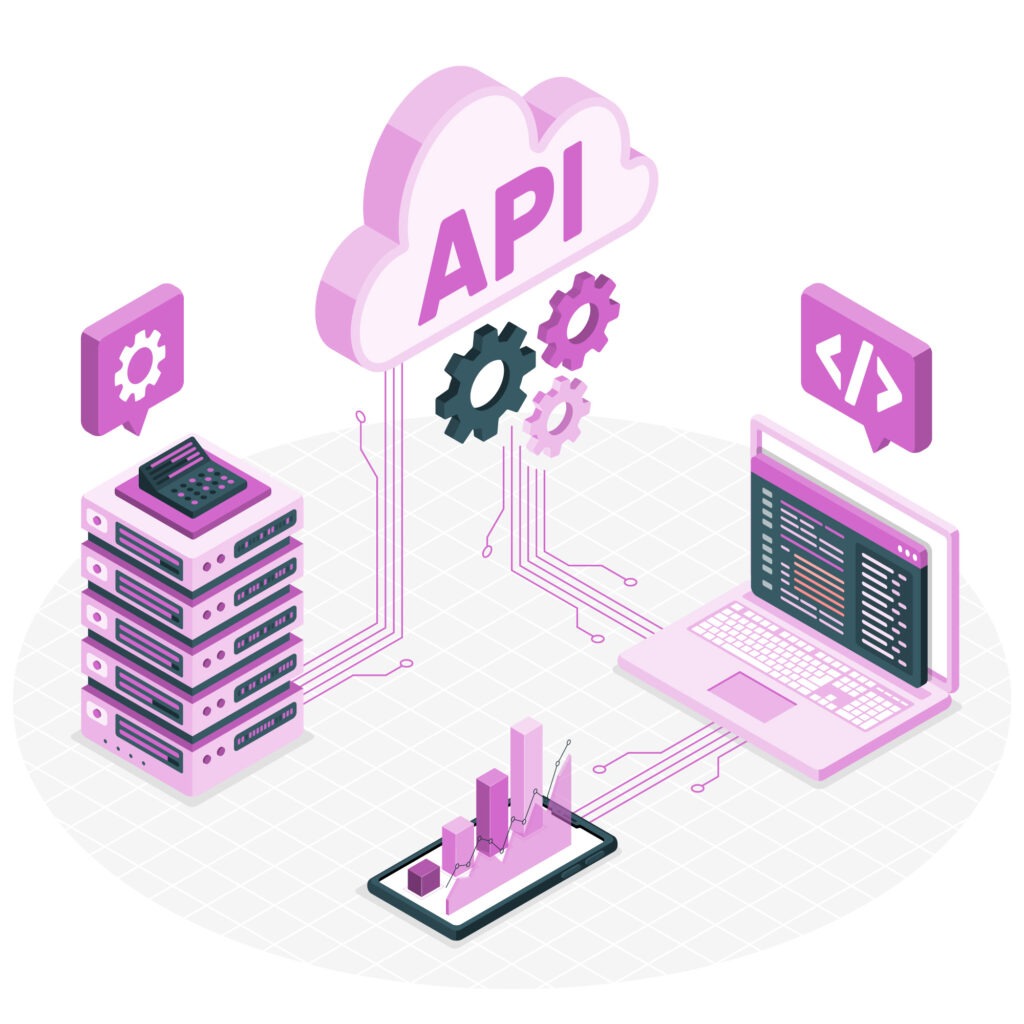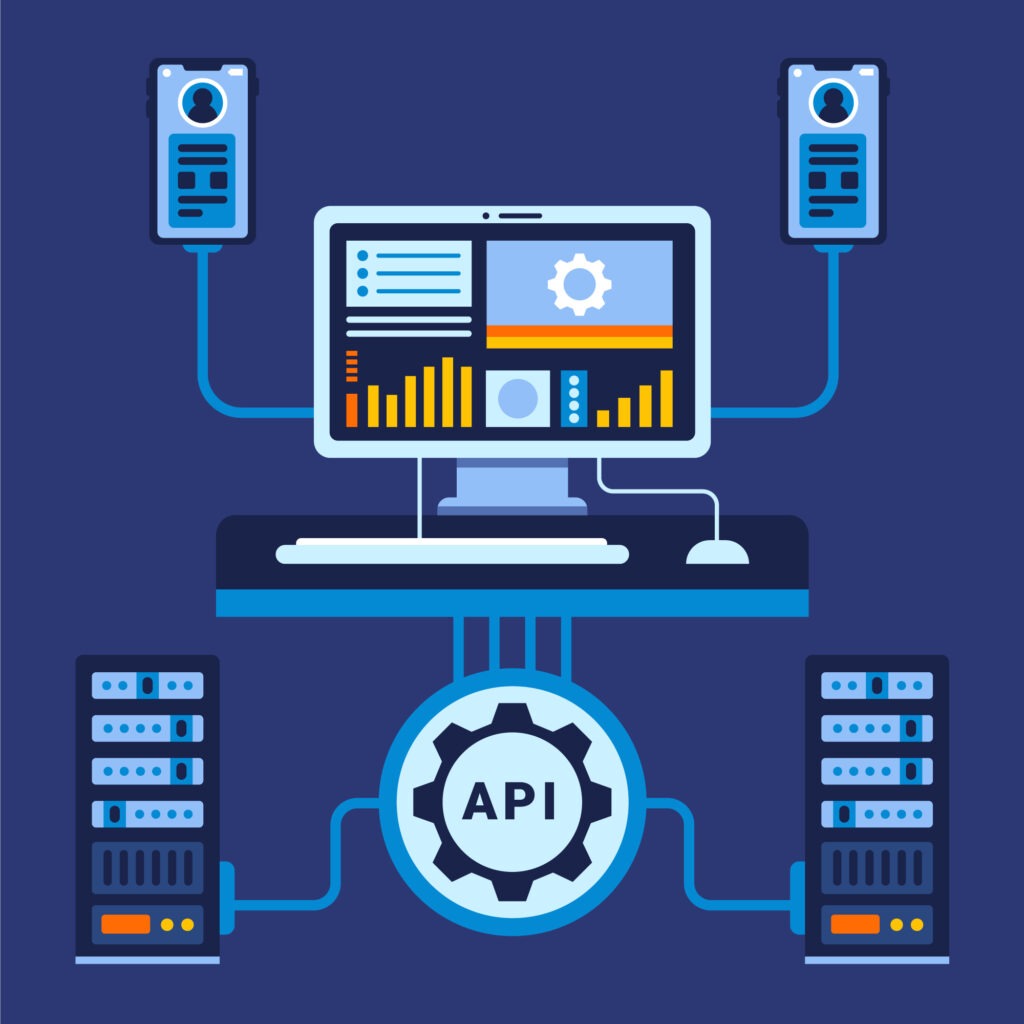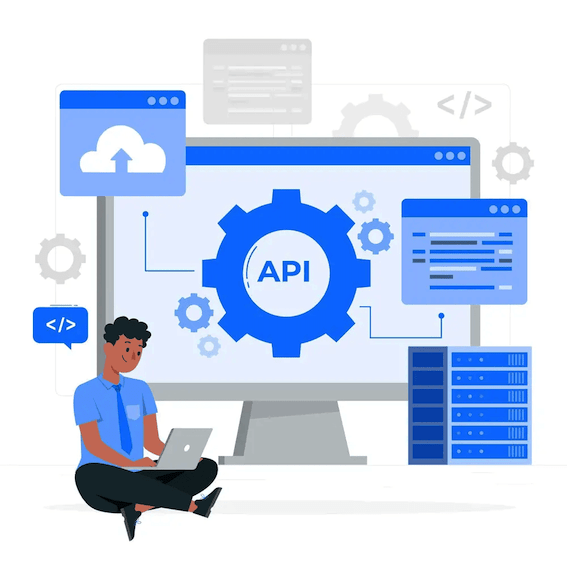In the evolving landscape of technology, falling behind industry trends can result in a loss of automation benefits and decreased productivity. If your business operations seem outdated and less efficient, it’s time to explore the transformative power of APIs.
At Mallow, our effective management of typical challenges like inefficient data exchange, slow automation, and outdated practices has resulted in positive outcomes for our clients. They have experienced improved operational efficiency and successfully navigated the dynamic technological landscape, positioning their businesses for ongoing growth and innovation.
After reading this article you know how APIs help to enhance overall integration within applications. You will have a clear perspective on how embracing Laravel for developing APIs can lead to a transformative shift in business operations, fostering efficiency, scalability, and sustained growth.
What role do APIs play in modern business?

Today APIs have emerged as a catalyst for transformative change. Acting as the connective thread in the digital world, APIs enable smooth communication and seamless data exchange among a variety of applications and systems. APIs act as the facilitators of interoperability, allowing disparate systems to communicate effortlessly. As highlighted in the 2024 Gartner report on API management, APIs serve as the foundational technology enabling digital transformation through seamless integration across complex enterprise ecosystems.
For example, consider a situation where an e-commerce platform integrates its system with marketing automation tools through APIs, such as Zapier. As soon as a customer makes a purchase, the API-driven automation can trigger a series of actions. For instance, an automated email can be sent to the customer expressing gratitude for their purchase and informing them about a special gift as a token of appreciation.
Simultaneously, the API can update the customer’s profile in the CRM system, ensuring that their preferences and purchase history are seamlessly recorded for future interactions. Through these API-driven workflows, businesses can not only automate post-purchase communication but also enhance customer engagement by delivering a personalised experience.
On the other hand, consider a scenario where a successful e-commerce platform operates solely through a web application. The business recognizes the need to scale and reach a broader audience on various devices. Without APIs, expanding to mobile devices and other platforms would be impossible which ultimately reduce your competitive advantages.
By implementing APIs, businesses can not only develop a mobile application seamlessly integrated with the existing system but it also third-party collaborations. The API serves as a bridge, enabling the mobile app to interact with the same backend infrastructure as the web app. As a result, the business achieves scalability by effortlessly extending its reach to diverse platforms and ecosystems, ultimately fostering growth and innovation.
How API integration can help you shift your business?

Enhanced interoperability
APIs act as digital bridges, enhancing interoperability by standardising communication between diverse software systems. This promotes seamless collaboration, breaking down silos, and fostering a cohesive operational environment. APIs establish a common language for diverse software systems, enabling them to communicate using standardized protocols. This shared understanding ensures that data exchange is consistent and reliable across various applications.
Efficient data exchange
API development optimises data exchange, expediting information transfer between applications. APIs significantly enhance data exchange efficiency by facilitating the transmission of only the required information. According to the 2024 Postman State of the API Report, 85% of organizations reported increased development speed after adopting APIs, and over 80% highlighted improved integration efficiency due to targeted data exchange. This targeted approach minimises data payload, reduces bandwidth usage, and accelerates response times.
Imagine a weather application that currently retrieves extensive weather data for different cities, presenting detailed day forecasts. However, implementing APIs will introduce you a refined approach. Rather than transmitting extensive day forecasts for all cities, APIs empower you to tailor requests, extracting only the pertinent data points specific to a chosen city. This targeted data retrieval not only conserves resources but also optimises the application’s performance.
Accelerated development
The modular nature of APIs allows for faster development cycles, translating into a quicker time-to-market for applications. Businesses can roll out features and updates at an accelerated pace, gaining a competitive edge in rapidly changing market conditions.With APIs, development teams can rapidly prototype applications by incorporating existing functionalities. This iterative approach allows for quicker experimentation and refinement of features, fostering a more agile and responsive development process.
Scalability and flexibility
Having an API opens up a spectrum of possibilities, allowing seamless integration with diverse platforms. For instance, if your application boasts an API, you have the flexibility to present it through not only responsive web applications but also dedicated mobile applications. This versatility is instrumental in meeting the diverse preferences of users. On the contrary, without APIs, the application is confined to a singular avenue, limiting its adaptability and scalability. APIs empower developers to future-proof their applications, accommodating changes in user behavior and technological advancements, ensuring that the software remains agile, responsive, and well-suited to evolving user needs.
What are the components of a well-designed API?

Building a good API involves attention to several crucial areas to ensure functionality, reliability, and ease of use. Here are the major components that contribute to creating a well-designed API:
✅ Implement secure authentication
✅ Proper access control management for the users
✅ Include support for webhooks and callbacks (if required)
✅ Effective versioning strategy
✅ Effective error handling
✅ Implement rate limiting
✅ Follow the best practices for request and response formatting
✅ Carryout the application’s testing properly
✅ Request validation has been done properly
Want to know more details about strategies for building API? Check out this article from TechTarget on building an enterprise API strategy.
Why is building APIs in Laravel a good option?

Ease of use
With Laravel API development, tasks that might be complex in other frameworks become straightforward.
Laravel’s routing system plays a pivotal role, providing a clean and intuitive way to define API endpoints. With concise and readable route definitions, linking different parts of your API becomes remarkably straightforward, enhancing overall code manageability. Laravel’s Object-Relational Mapping (ORM) system, Eloquent, further contributes to the ease of API development. Eloquent abstracts database interactions, enabling developers to work with databases using an elegant and intuitive syntax. This simplification not only accelerates the development process but also ensures that API endpoints seamlessly translate data between the application and the database.
Cost-effective and reduced turnaround time
Laravel’s rapid development capabilities contribute to cost-effectiveness and reduced turnaround time. The framework streamlines common development tasks, allowing you to focus on building features rather than dealing with repetitive configurations. This not only accelerates the development process but also translates to cost savings for businesses looking to optimise their development efforts. With Laravel, you can leverage features like eloquent ORM for database operations, and artisan command for creating a base setup for your API.
Security and authentication
Laravel’s authentication packages simplify user authentication, ensuring secure access to API resources. According to the OWASP Foundation’s 2024 API Security Report, frameworks that integrate OAuth2 standards, such as Laravel Passport, provide robust mechanisms to safeguard API endpoints from unauthorized access. Laravel Passport offers a full OAuth2 server implementation, simplifying the integration of token-based authentication, while Laravel Sanctum provides a lightweight package for API token authentication without the need for a full OAuth2 server.
Laravel includes features like encryption and secure password hashing. The security best practices make it a reliable choice for businesses seeking to build APIs with a strong emphasis on data protection and user authentication.
For more details about choosing the right packages for authentication in Laravel, checkout this article on the best authentication method in Laravel.
Easy request validations
Laravel simplifies the process of request validation, providing you with an intuitive and expressive syntax to validate incoming data. The framework’s built-in validation tools enable you to enforce rules effortlessly, ensuring that API requests meet specified criteria.
With Laravel’s elegant validation syntax, you can define rules and error messages precisely, making the validation process clear and concise. This ensures that APIs built in Laravel are not only secure but also maintainable and developer-friendly.
Rate limiting
Laravel simplifies the implementation of rate limiting for APIs, allowing businesses to control the number of requests clients can make within a specified timeframe. This built-in functionality helps prevent abuse, ensuring fair usage of API resources and maintaining optimal performance. Laravel’s rate-limiting features are configurable and easily integrated, providing businesses with a flexible tool to manage API usage effectively.
By incorporating rate limiting in Laravel APIs, businesses can safeguard against potential misuse or excessive requests, promoting a more controlled and reliable API experience for users.
Easy versioning
Laravel simplifies API versioning, allowing you to manage changes and updates seamlessly. With Laravel’s flexible routing options, businesses can release new versions of their APIs without disrupting existing users. This ensures that businesses can evolve their APIs in tandem with changing requirements.
Test-driven development (TDD)
Laravel is well-aligned with Test-Driven Development (TDD) principles, empowering you to write tests before implementing features. This approach ensures that APIs are thoroughly tested for functionality and performance, reducing the likelihood of bugs and enhancing overall code quality.
Laravel’s built-in support for PHPUnit and testing tools streamlines the TDD process, making it a natural fit for businesses that prioritise comprehensive testing in their development workflow. Laravel’s commitment to TDD encourages a robust testing culture, where you can confidently make changes and additions to the API codebase, knowing that automated tests will catch potential issues.
API Documentation
Since tools like Swagger and OpenAPI allow for automatic documentation generation, ensuring that API endpoints, parameters, and responses are well-documented. This accessibility promotes a smooth onboarding experience for you and encourages the adoption of the API.
By leveraging these packages with the help of Laravel’s API documentation features, businesses can enhance transparency, reduce support inquiries, and foster a collaborative development ecosystem. Clearly documented APIs contribute to overall usability and ease of integration for you interacting with the API.
Building a Laravel application that’s ready to scale
Whether you’re looking to scale an existing application or embark on building a Laravel application from the ground up, this framework provides the tools and capabilities that are essential for success in the digital landscape.
If you’re in the early stages of planning your Laravel application, our guide on building a Laravel application from scratch offers a comprehensive roadmap to kickstart your development journey. Laravel APIs, with their flexibility, security, and developer-friendly features, emerge as a cornerstone for businesses seeking to thrive in the dynamic realm of modern technology.
Alternatively, if you already possess an application, it becomes imperative to familiarise yourself with the vital prerequisites before advancing with the scaling process. Discover insights and best practices in our article on essential considerations and strategies for scaling your application.
Have questions about building or optimising your Laravel application or APIs? Feel free to get in touch with our team.
Your queries, our answers
Yes, we can continue developing your existing Laravel application. Please provide the current project details so we can assess and proceed. For more details, get in touch with our team.
No, we focus on custom Laravel solutions tailored specifically to your needs. We do not offer pre-built, off-the-shelf products.
Yes, we develop Laravel applications for various domains, including e-commerce, healthcare, finance, and more.
The cost varies based on the project's complexity and scope. For a basic MVP, costs generally range from $20,000 to $40,000 for web apps and $10,000 to $25,000 for mobile apps. For more advanced applications, costs can be higher. We offer a detailed cost breakdown tailored to your specific needs. To know more, check out our article on How much does it cost to work on a Laravel project with Mallow? and discover how we can build a strong partnership together.
The timeline depends on the project's complexity. A basic project may take a few weeks, while more complex applications could take several months.
Yes, we can align our working hours with your time zone to facilitate effective communication throughout the development process. For more details on how you can handle timezone differences efficiently, do check out our article on how to handle timezone differences while working with an offshore development team.
Mallow offers the following outsourcing models: Project-based outsourcing, Staff augmentation, & Dedicated development team (DDT)
Yes, we offer maintenance and support services to ensure your Laravel application remains up-to-date and functional.
Yes, you will own the intellectual property rights of your Laravel application upon project completion. Check out our article on why owning intellectual property rights while outsourcing your application is important.
The cost is influenced by several factors including the complexity of the project, the number of features required, and whether the application is for web or mobile. We provide a personalized estimate based on your project details.
We work with the latest stable versions of Laravel and can also support older versions if needed based on your project requirements. For more details check out our article on Laravel upgrade: when and how to transition to the latest version
Yes, we offer post-deployment support to address any issues and provide updates as needed.
To hire a Laravel developer from Mallow, you can contact us with your project requirements. We'll discuss your needs, suggest suitable developers or teams, and provide you with a proposal. Once the terms are agreed upon, we can start the development process.
Yes, you can hire a dedicated Laravel developer or a team of developers from Mallow. This allows you to have a dedicated resource working exclusively on your project, providing more control and flexibility over the development process.
To hire the right laravel developer for your project, check out this article on tips to hire the right Laravel developer.
Author
Anandhan
Anandhan is a passionate technical lead at Mallow, where he plays a crucial role in driving innovation and overseeing the development of cutting-edge solutions. With a wealth of experience in the field of technology, he consistently strives to elevate his team's performance and deliver exceptional results. His multifaceted interests inspire him to approach challenges with creativity and an open mind, leading to innovative solutions that transcend conventional boundaries. Beyond his professional endeavours, Anandhan nurtures a love for literature and cinema. During his free time, you'll often find him engrossed in the pages of books across various genres, exploring diverse narratives and gaining insights from authors around the world.



